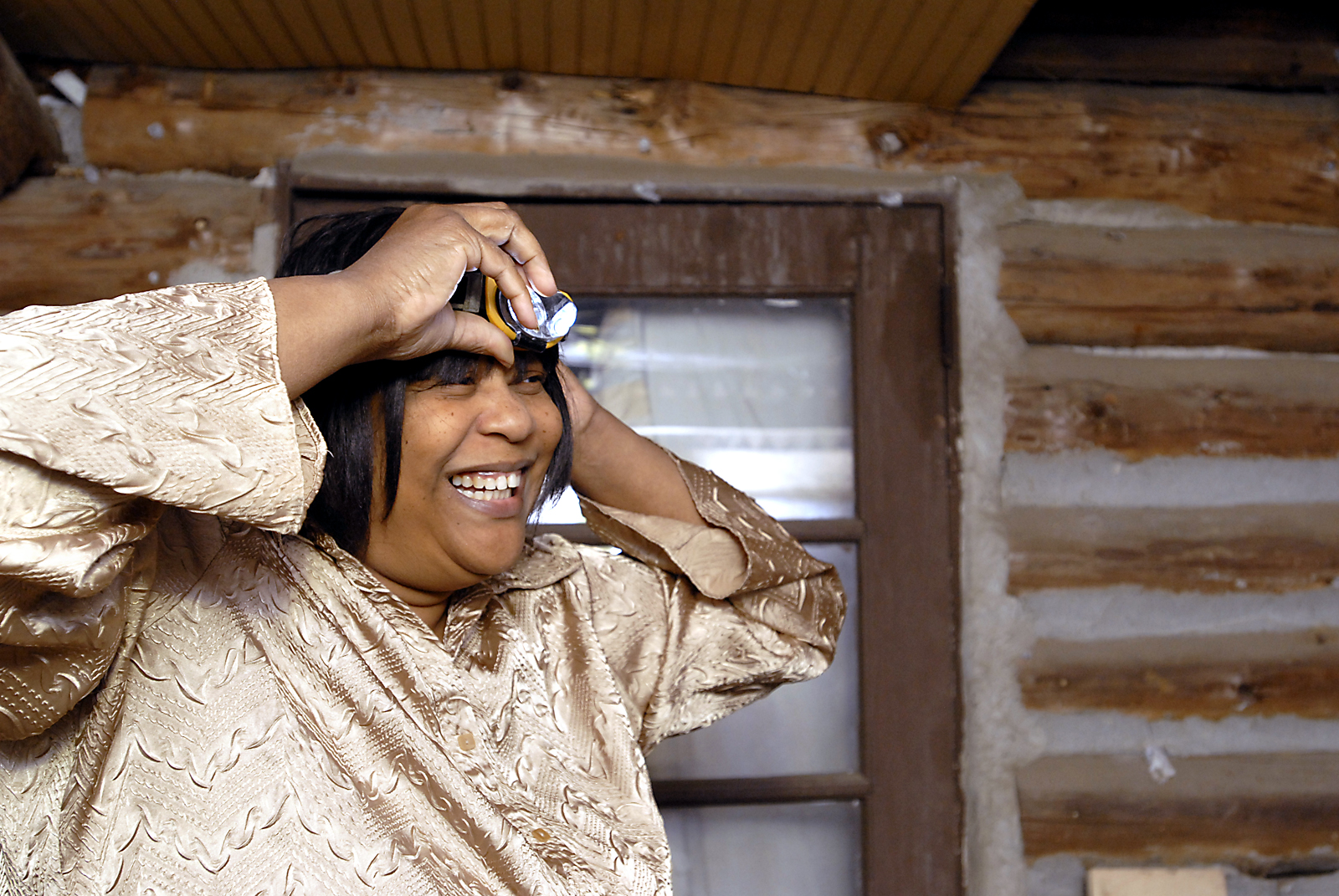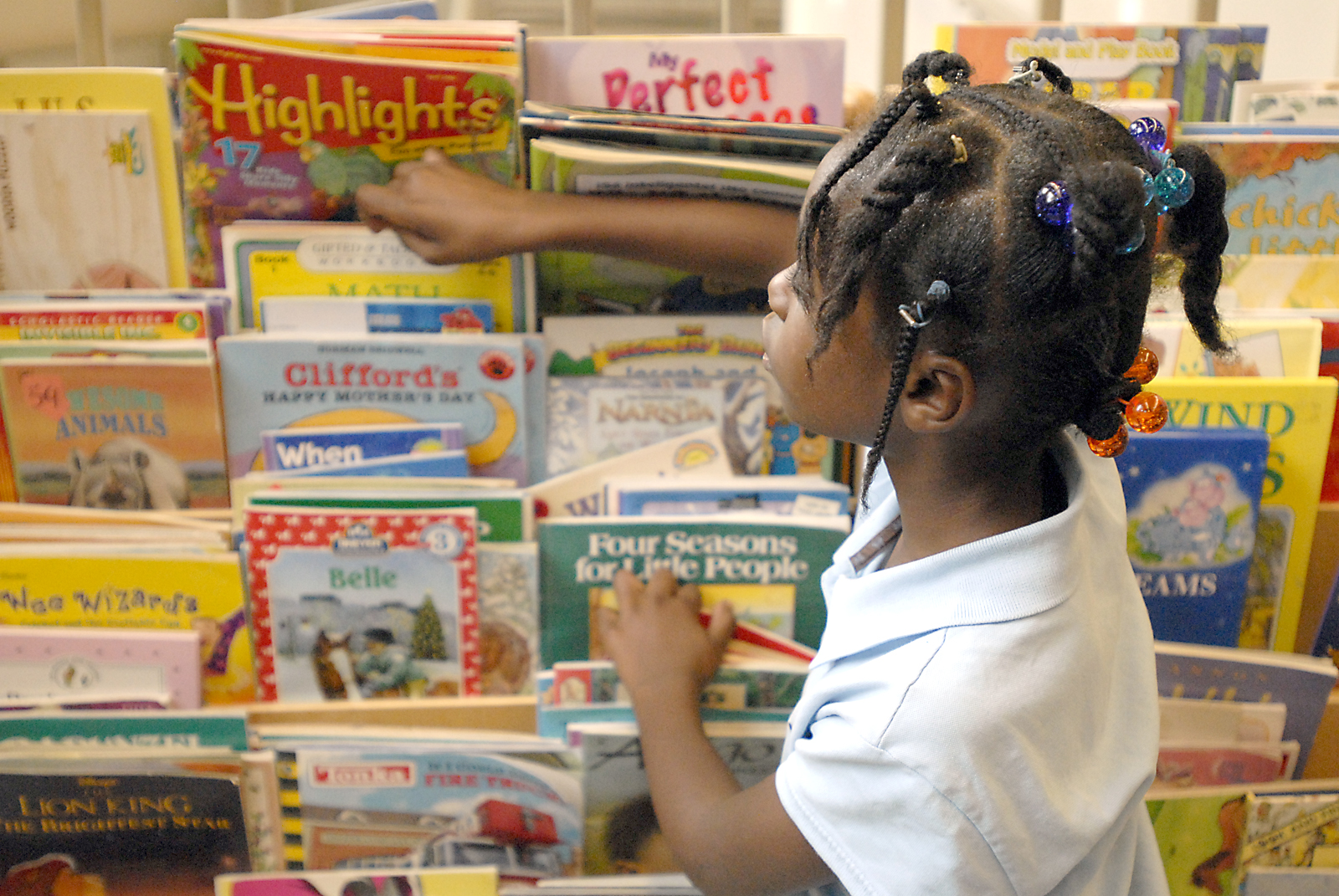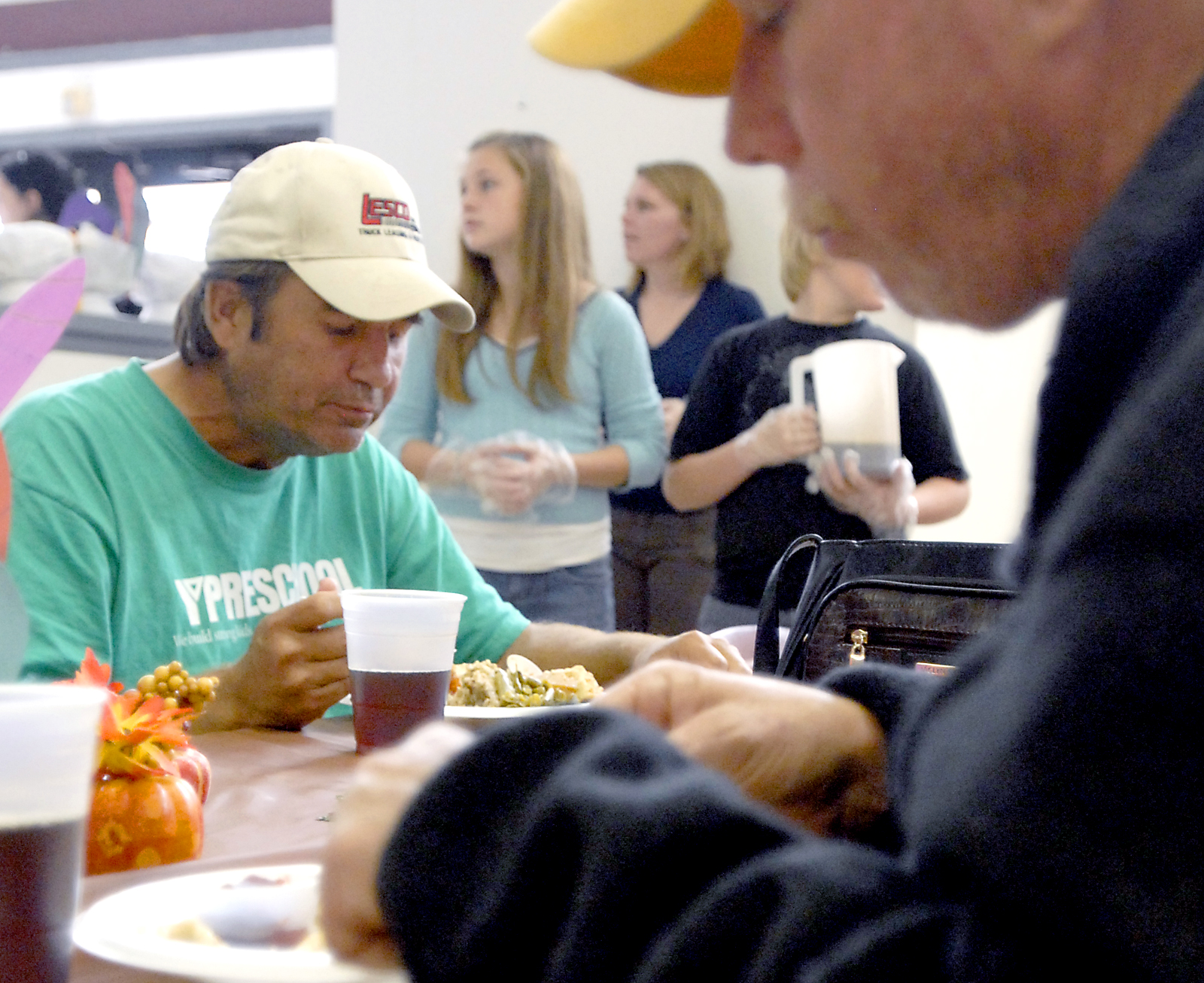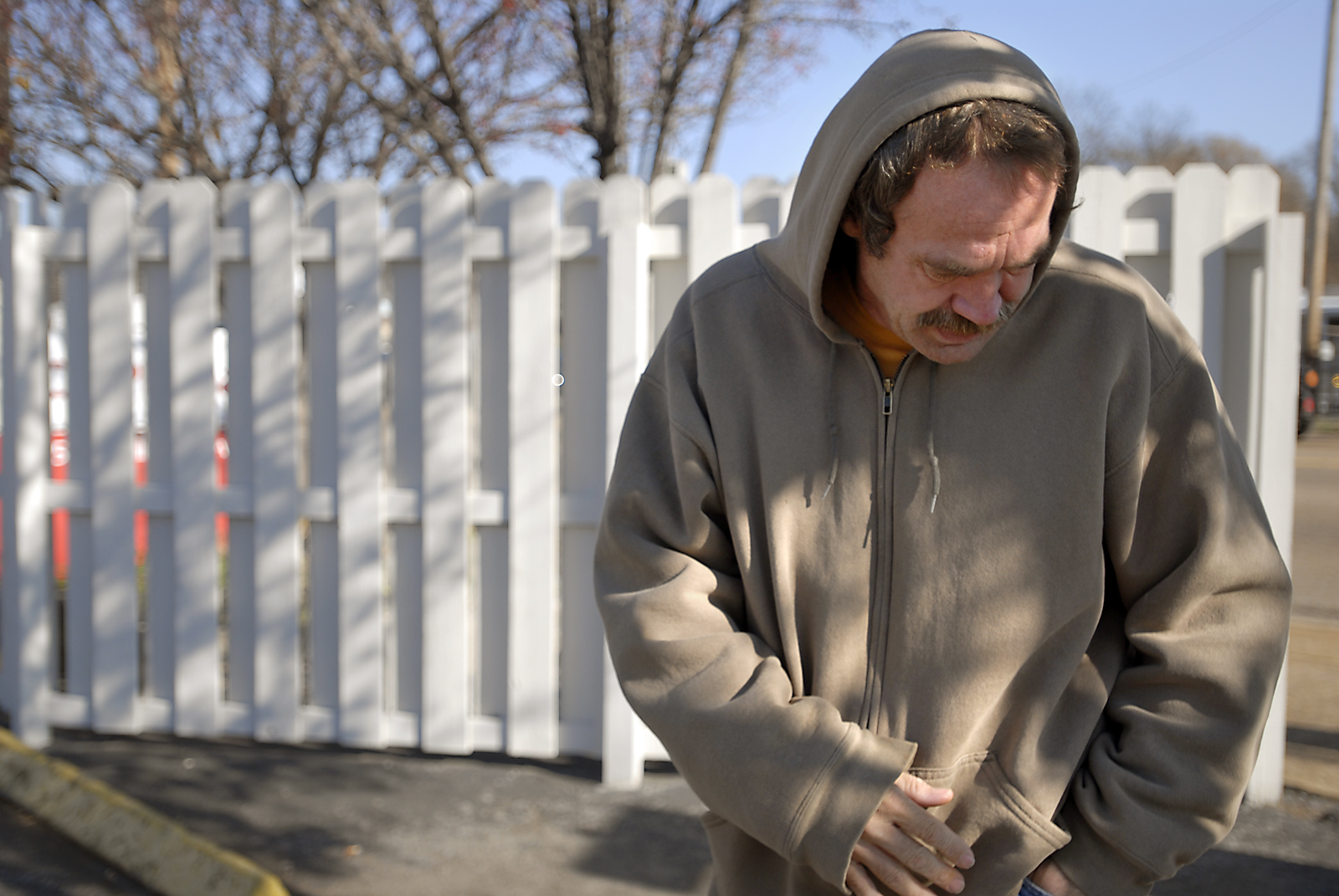While millions of Americans contemplate what to buy and how much to spend on Christmas gifts this year, hundreds, perhaps thousands of homeless people in Chattanooga worry about where they will find shelter on cold nights.
More than one-quarter of Chattanooga's homeless are children. Like all children this time of year, they talk about presents. Seven-year-old Sdigehya said she wants a doll and a puppy.
Her mother, 21-year-old Cristy Hudson, wants that, too. But more than that, the young woman -- left homeless after her mother was shot to death -- wonders where she and her daughter will spend Christmas.
And it's not just the homeless who struggle.
Thousands more in the Chattanooga area have shelter but lack money for basic necessities such as food and electricity. In all, at least 26,400 people, or 17 percent of the city's population, live in poverty, according to the U.S. Census Bureau.
In rural Georgia, a disabled husband and his wife live in a cabin without electricity or running water. William and Valerie Roush wear headbands with battery-operated lights so they can see in the dark.
They have song and they have each other. But not much more.
Howard Glenn, a homeless veteran with Parkinson's disease, relies on music, too.
He plays the guitar for tips on the Walnut Street Bridge. On good days, he gets enough to buy a package of hot dogs that he cooks over a fire outside his tent. Some days, he goes without.
Christmas? Just another day. Christmas tree? No way.
There will be a tree -- and a home-cooked Christmas dinner -- for Faith McKenna and her 11-year-old daughter, Niki. There will be a few presents under the tree, too, but the best gift may be their freedom from domestic violence.
The pair broke free from an abusive relationship a couple of years ago, but that meant homelessness, then an apartment with no stove and mold growing on the floor.
They're doing better now.
"You do what it takes," said Mc-Kenna.
That's exactly what Phillip Headricks is doing.
The unemployed single father donates plasma twice a week in hopes of making enough money to buy Christmas presents for his mother and his son.
"If it wasn't for donating plasma and ... [food stamps], I don't know what I'd do," he said.
'MY SON NEEDS CHRISTMAS'
Phillip Headricks gives plasma twice a week every week to make sure he is able to buy a coffeepot for his mother and a game for his son's Xbox 360.
"My son needs Christmas," said Headricks, an unemployed single father. "They give me $20 on my first visit and I get $40 on my second visit." he said, referring to CSL Plasma on Ringgold Road in Chattanooga.
Headricks, 46, is among thousands of local people who donate plasma to help make ends meet. Some people also donate for the sole purpose of helping others, said Chris Florentz, spokesman for CSL Plasma. People donate their plasma but are paid for their time, he said.
Headricks worked as a roofer for more than 20 years. But then his knees gave out and he stopped climbing on roofs. That was about six years ago.
He started working for temp services. His last job was in August, and he's looking for work.
He and his son, 13-year-old Josh, moved in with Headricks' mother in Rossville in September.
Headricks remembers last year, when he was working at Farley & Sathers Candy Co. in Tiftonia. He didn't have to struggle as much to get gifts, and he had his own place.
"Having a steady income makes everything easier," he said.
His son showed Headricks a game that costs $69, but the game he really wants costs $80, Headricks said.
He's saved $37 so far. He wants to get $100 to get the game and coffeepot.
"If it wasn't for donating plasma and [getting food stamps], I don't know what I'd do," Headricks said.
For the past four years his son has made honor roll. That, in part, is what drives Headricks.
"The way I look at it is if he could do good in school, he'll be rewarded with that gift because he's trying in school," Headricks said.
'SIMPLE THINGS' MAKE UNEMPLOYED COUPLE HAPPY
For seven years Valerie and William Roush have lived in a cabin on a cliff on the back side of Raccoon Mountain. The cabin has no running water or electricity.
"We have no Christmas tree, no gifts to put under it, but we always have fun," Valerie Roush said.
They spoke from their cabin at night while wearing headbands with battery-operated lights so they could see in the dark. They have a wood stove that warms the house, and they collect rainwater in containers for showers.
"We don't know yet how we're going to spend Christmas," said Valerie Roush, 51. "We don't have money, but we have a hymn book and we sing. Simple things make us happy."
In a deep contralto, Valerie Roush broke out singing about how her husband takes care of her on the mountain. To the tune of Kanye West's "Gold Digger," she sang, "He gives me money when I am broke."
William Roush sang background, "Oh, yeah, baby."
Then both burst out laughing.
They have been married eight years and have no children.
Neither is employed. They once were enrolled at the College of Health Evangelism at the Wildwood Lifestyle Center in Wildwood, Ga. Willialim finished in 2004, and Valerie dropped out in hopes of finding a job.
At first, living in the cabin was an adventure. And they do live rent-free.
But when William Roush, 55, needed advanced medical treatment for back pain, Valerie Roush started putting in more applications for employment.
Sometimes he has so much back pain that his body spasms and he can't walk. At best he walks with a cane.
She wants to live and work in Chattanooga.
For now, getting to the city for job hunting or finding a place to live means catching a ride with someone.
The Roushes have a truck that they use to get up and down the mountain, but they have to drive backward the entire way: The truck's transmission operates only in reverse.
'I'M A SINGLE MOM ... YOU DO WHAT IT TAKES'
After being homeless for nine months and living in substandard housing for 18 more months, Faith McKenna and her 11-year-old daughter, Niki, will have Christmas dinner in their own apartment this year.
It will be their first home-cooked holiday dinner in two years.
Faith McKenna is planning a traditional dinner, paid for with her own money from working as the Community Kitchen's assistant manager of food services. This year there will be a tree with a few presents under it, too.
"Having a job brings stability," said McKenna, 36.
Their last apartment had no stove. Mold grew on the floor, and they had to wear shoes when they opened the refrigerator to keep from getting shocked. But even that was a step up from homelessness, said McKenna.
"I'm a single mom and you do what it takes," she said.
McKenna was homeless for nine months after leaving a violent boyfriend, she said.
"My decisions weren't hers, but she [Niki] was suffering for them," McKenna said.
More than 130 area women and children were homeless and stayed in the Partnership Family Violence Center last year as a result of domestic violence. The shelter houses women and children an average of 90 days, according to Holly Ashley, the partnership's communications manager.
"This is a small fraction of the domestic violence cases we've served, the people who had nowhere else to go," said Ashley. "There are still others who received services elsewhere or had a friend or relative to stay with."
Even after escaping physical abuse at home, Niki endured taunts at school from students who noticed stains on her clothes and teased her about being homeless.
It's been about a month since the McKennas moved into their new apartment equipped with running water, electricity and a stove, but Niki still comes to the community kitchen regularly to help her mom serve food.
Niki said she knows what it's like when people don't talk to you because you're homeless, and she wants to interact with others as much as possible.
"Just because you have a house doesn't make you a better person," Niki said.
'NO CHRISTMAS TREE FOR ME,' SAYS HOMELESS VET
On Christmas Day, Howard Glenn's plan is to survive.
"I'll get up," said Glenn, a homeless veteran who has Parkinson's disease. "That's about it. No Christmas tree for me."
Glenn, 49, served in the Marines and the Army. He worked for a time as a paramedic and made a living for seven years as an independent contractor painting and building houses.
But by October 2009 his hands shook so uncontrollably that he could hardly paint anything. Two months later, he was diagnosed with Parkinson's disease and could no longer work.
"If I wasn't on medicine, I'd shake this table off," said Glenn while finishing his dinner at the Chattanooga Community Kitchen. He tried to fold his arms as he spoke, but one hand wouldn't stop shaking enough for him to keep it down.
Glenn is among more than 250 veterans in the Chattanooga area who will be homeless for the holidays, according to the National Coalition for Homeless Veterans.
He hopes to get on disability. Until then, he sleeps outdoors in a tent and goes to the Community Kitchen most days for at least one hot meal.
He dressed in T-shirts and blue jeans until Thanksgiving Day when temperatures hovered around 60 degrees. Soon after, when the weather turned colder, Episcopal monk Brother Ron Fender brought Glenn a long-sleeved T-shirt and gave him a clothing voucher. Glenn purchased a black-trimmed blue coat and a hat.
Police have warned Glenn that he can't sleep outside in a public place, but he says he has nowhere else to go. So he stays at the spot that he prefers to keep a secret, hoping not to draw attention to his campsite again.
Glenn occasionally plays guitar near the Walnut Street bridge for money.
"I froze my butt off yesterday," he said one day recently. "I played four hours and made $6."
His guitar lacks tune keys. He came to Chattanooga three years ago with a new guitar that his brother bought him for his birthday, but it was stolen one night while he slept.
Fender gave him the one he has now.
Glenn uses the money he makes from playing to buy thick socks, as well as franks to grill over a fire outside his tent. Some days he doesn't make any money.
When that happens, his morning meal at the Community Kitchen is all he eats all day.
'I NEED A ROOF OVER MY HEAD,' SAYS YOUNG MOTHER
A gunshot to the head killed Cristy Hudson's mother on Easter Sunday.
News reports stated that it might have been a random shooting. No one has been charged in the case.
Four months later, without her mother's financial support, 21-year-old Hudson couldn't afford to pay rent in her public housing apartment so she and her 7-year-old daughter, Sdigehya, became homeless.
Of the estimated 4,100 people who experience homelessness annually in the Chattanooga region, more than 1,000 of them are children, according to the Chattanooga Homeless Coalition.
Hudson lived in shelters -- first three months at the Chattanooga Rescue Mission, then a month at St. Catherine's Shelter. But at the end of November, her time there ran out.
A family member said Hudson and her daughter can stay at her house for a week. After that, Hudson said, she doesn't know where she's going to live or how she's going to spend Christmas.
"I need a roof over my head," she said. "I need that so I can get my daughter a good Christmas."
Hudson doesn't work but she said she has put in job applications all over town.
Speaking from the Chattanooga Community Kitchen's day room, she reminisced about Christmases past when her mother would come to her apartment bearing home-cooked food, toys and dresses for Sdigehya.
Hudson paused to tell a man in the day room to stop cursing in front of her daughter.
"I'm grown," the man responded, and continued.
Sdigehya continued playing as if she hadn't heard anything. Asked about her favorite subject in school, she said, "games." Then, "lunch."
Sdigehya attends second grade at Calvin Donaldson Elementary School and plays with her peers with no worry over being homeless. She said she likes coming to the Community Kitchen, where she gets a hot meal, reads books and plays with friends.
"I want a big doll and a puppy for Christmas," she said.
Contact staff writer Yolanda Putman at yputman@timesfreepress.com or 423-757-6431.




